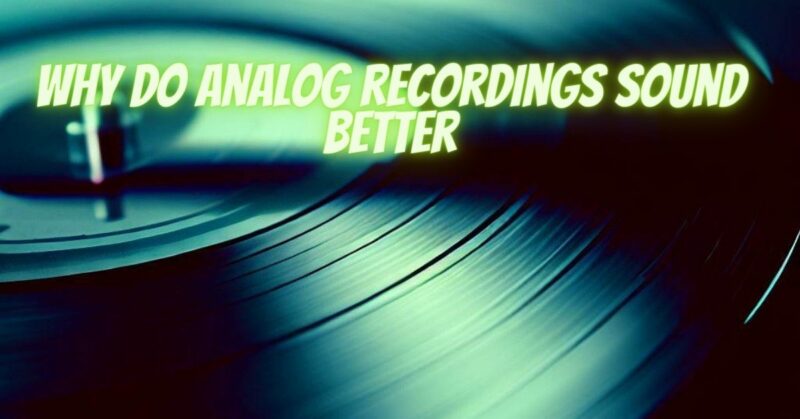Analog recordings have a distinct sonic appeal that has captivated audiophiles and music enthusiasts for decades. The warmth, richness, and authenticity of analog sound have led many to believe that analog recordings sound better than their digital counterparts. In this article, we will explore the factors that contribute to the unique and desirable characteristics of analog recordings and why they are often perceived as sounding better.
- Capturing the Nuances of Sound:
Analog recording methods, such as magnetic tape or vinyl records, have the ability to capture the full range of audio frequencies and dynamics present in a performance. The continuous nature of analog signal capture results in a faithful representation of the original sound, including subtle details, harmonics, and transients that digital recordings can sometimes struggle to replicate.
- Harmonic Distortion and Saturation:
Analog recording systems, particularly tape-based systems, introduce a form of harmonic distortion and saturation that adds warmth and character to the sound. This occurs due to the non-linearities of magnetic tape or the natural compression of vinyl grooves. These imperfections, when properly managed, contribute to the desirable qualities of analog sound, providing a more pleasing and organic listening experience.
- Natural Dynamic Range:
Analog recordings have a wider and more natural dynamic range compared to some digital recordings. Analog mediums have a higher tolerance for sudden, loud transients without clipping or distortion, allowing for a more faithful representation of the original performance’s dynamics. This dynamic range contributes to a sense of realism and liveliness in analog recordings.
- Imperfections and Human Touch:
Analog recordings are not perfect, and that imperfection can contribute to their appeal. Analog systems, such as tape recorders or vinyl playback, may introduce subtle variations, noise, or distortions. These imperfections add a unique and human quality to the sound, making it feel more organic and alive. It is this imperfection that often resonates with listeners, evoking a sense of nostalgia and emotional connection to the music.
- Listener Subjectivity:
Sound perception is subjective, and individual preferences play a significant role in the perceived quality of recordings. Some listeners prefer the warmer, more colored sound of analog recordings, finding it more pleasing and engaging. The subjective nature of sound perception contributes to the belief that analog recordings sound better, as the personal connection and enjoyment derived from the sound are paramount.
Conclusion:
Analog recordings possess unique characteristics that contribute to their distinct and often preferred sound quality. The capturing of nuances, harmonic distortion and saturation, natural dynamic range, imperfections, and listener subjectivity all play a role in the appeal of analog sound. However, it’s important to note that advancements in digital recording technology have narrowed the gap, and many high-quality digital recordings can provide exceptional sound reproduction.
Ultimately, the perceived superiority of analog recordings is rooted in personal preferences, emotional connection, and the desire for a sound that feels authentic and evokes nostalgia. Whether analog or digital, both mediums have their merits, and the choice between them is a matter of individual taste and appreciation for the unique qualities they offer.


